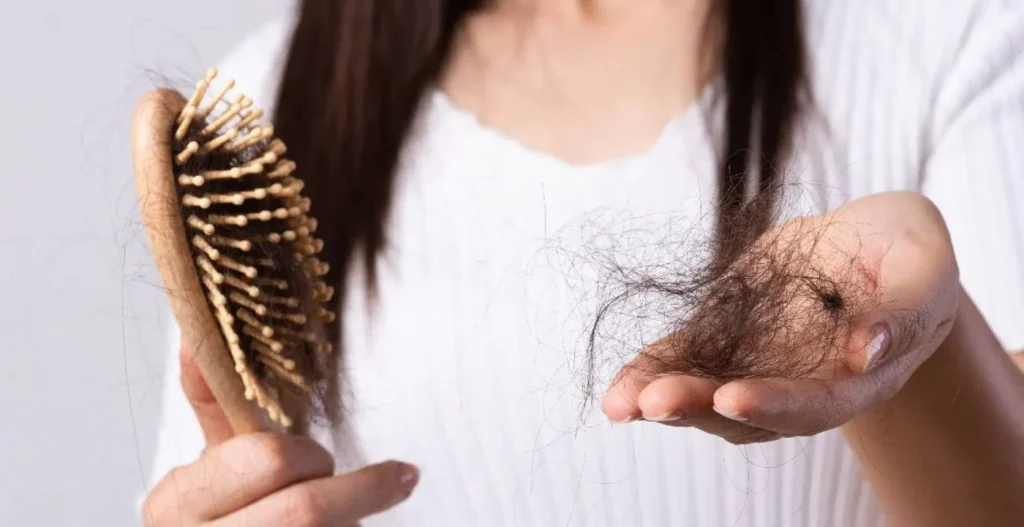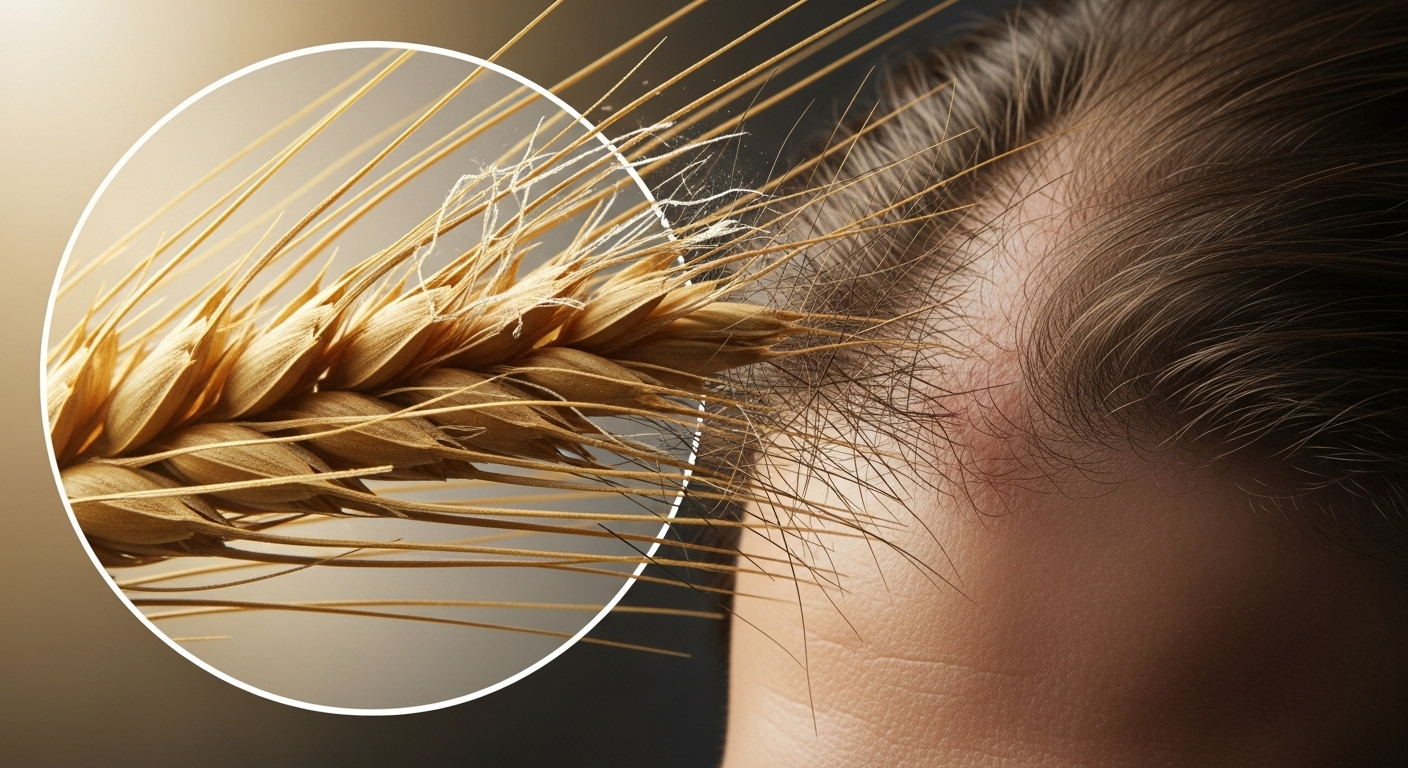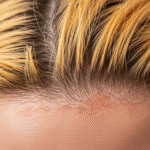Hair loss can be a frustrating and distressing experience, and many people are looking for answers. One possible culprit that’s often overlooked is gluten. Gluten and hair loss are linked in certain individuals, especially those with gluten sensitivities or celiac disease. In this article, we’ll explore how gluten can affect hair growth and what steps …
Hair loss can be a frustrating and distressing experience, and many people are looking for answers. One possible culprit that’s often overlooked is gluten. Gluten and hair loss are linked in certain individuals, especially those with gluten sensitivities or celiac disease.
In this article, we’ll explore how gluten can affect hair growth and what steps you can take to manage hair loss. You’ll also learn how to optimize your diet to support healthy hair growth.
By the end of this post, you’ll understand the connection between gluten and hair loss and how making dietary changes can potentially improve your hair health.

What is Gluten, and How Does it Affect Your Health?
Understanding Gluten and Its Role in the Body
Gluten is a protein found in wheat, barley, rye, and oats. It’s what gives dough its elasticity and helps it rise. For most people, gluten is a harmless part of their diet, but for some, it can cause severe health issues, especially in those with gluten intolerance or celiac disease.
When gluten is consumed by individuals with these conditions, it triggers an immune response that can damage the small intestine lining. This damage can lead to malabsorption of essential nutrients, including those necessary for healthy hair growth, such as iron, zinc, and vitamins.
Common Health Issues Linked to Gluten
For people with gluten intolerance or celiac disease, consuming gluten can cause a variety of symptoms, including digestive issues, fatigue, skin problems, and hair loss. Inflammation in the intestines prevents proper nutrient absorption, which, over time, can lead to deficiencies that hinder hair growth.
Gluten and Hair Loss: What’s the Connection?
How Gluten Can Trigger Hair Loss
The immune response to gluten in individuals with celiac disease or gluten sensitivity can lead to inflammation in various parts of the body, including the scalp. This inflammation affects the hair follicles and can lead to hair thinning or even alopecia areata, a condition where the immune system attacks hair follicles.
Furthermore, nutrient deficiencies caused by gluten-related gut issues, such as deficiencies in iron, zinc, and vitamins, can weaken the hair and make it more prone to shedding. These deficiencies can also affect the cycle of hair growth, leading to longer periods of shedding.
Scientific Evidence Supporting the Link Between Gluten and Hair Loss
Several studies have highlighted the connection between gluten-related diseases and hair loss. Research shows that celiac disease may result in hair thinning, especially in those who do not adhere to a gluten-free diet.
According to a study published in the Journal of Dermatology, people with celiac disease who began following a gluten-free diet experienced significant improvements in hair growth over time.
Additionally, a review by Dr. Rana Irfan, a dermatology expert, confirms that gluten sensitivity can cause a disruption in the hair growth cycle, leading to increased hair shedding.
Celiac Disease and Its Effect on Hair Growth
Celiac disease, an autoimmune disorder triggered by gluten, is one of the most common links between gluten and hair loss. When someone with celiac disease consumes gluten, the immune system reacts by attacking the small intestine.
This leads to poor nutrient absorption and can result in a condition called telogen effluvium, a form of hair loss triggered by stress or nutritional deficiencies.
The good news is that once the individual eliminates gluten from their diet, hair growth can resume in many cases, although the recovery process may take time.
How to Manage Gluten-Induced Hair Loss

Steps to Take If You Suspect Gluten is Affecting Your Hair
If you notice increased hair shedding after consuming gluten, the first step is to consult with a healthcare provider. A blood test or biopsy may be necessary to determine whether you have celiac disease or gluten intolerance. Once a diagnosis is confirmed, switching to a gluten-free diet is the most effective way to stop further hair loss.
Nutritional Support and Supplements for Hair Health
In addition to eliminating gluten, it’s essential to support your hair’s health with the right nutrients. Foods rich in iron, zinc, and biotin can promote healthy hair growth. Zinc, in particular, plays a vital role in cell reproduction and tissue growth, making it an essential nutrient for hair follicles.
Consider incorporating the following into your diet:
- Leafy greens (spinach, kale)
- Fish and seafood (salmon, sardines)
- Eggs
- Nuts and seeds (pumpkin seeds, almonds)
- Gluten-free whole grains (quinoa, brown rice)
Supplements may also be beneficial, especially if dietary changes are not enough to resolve deficiencies.
Eliminating Gluten: What You Need to Know
Switching to a gluten-free diet may seem daunting at first, but it’s an essential step in improving your hair health if gluten is causing your hair loss. Begin by eliminating all sources of gluten, including bread, pasta, and processed foods that contain wheat or barley.
Many gluten-free alternatives are available, including gluten-free bread, pasta, and snacks, making the transition easier.
It’s also crucial to read food labels carefully, as gluten can hide in many packaged foods. Work with a nutritionist if you need assistance in planning balanced, gluten-free meals that support hair health.
FAQs
Can Gluten-Free Diet Help Regrow Hair?
Yes, many individuals who experienced hair loss due to gluten intolerance or celiac disease have reported hair regrowth after eliminating gluten from their diet. However, it may take several months for noticeable results.
Does Gluten Cause Hair Loss in All Individuals?
No, gluten does not cause hair loss in everyone. Only those with gluten sensitivity or celiac disease are likely to experience hair thinning due to gluten consumption.
How Long Does it Take for Hair to Regrow After Going Gluten-Free?
It can take anywhere from 3 to 12 months for hair to regrow after eliminating gluten, depending on the severity of the hair loss and how quickly the body heals.
Conclusion:
If you suspect that gluten is affecting your hair, it’s crucial to consult with a healthcare professional for a proper diagnosis. A gluten-free diet is the most effective treatment for gluten-induced hair loss, and with proper nutritional support, you can improve your hair health.
Remember, the journey to regrowth may take time, but with the right steps, you can regain confidence in your hair.
Ready To Take Your Next Step
Concerned about gluten’s impact on your hair? Book a consultation with Dr. Uzma Irfan, an ISHRS-certified surgeon in Islamabad today to discuss your symptoms and explore a personalized, gluten-free diet plan that promotes healthy hair growth.






